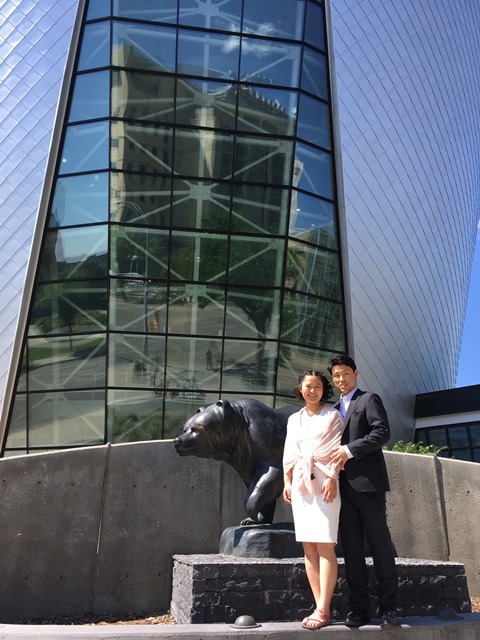
During his time at UAlberta, Shintaro met fellow graduate student and his future wife, Jingjing Gui. The two were married on campus in the summer of 2017.
Well-being and happiness, and their intrinsic connection to leisure experience, has always been of interest to PhD graduate Shintaro Kono. After earning a bachelor's degree in sports and leisure management from Tokai University in Kanagawa, Japan, Shintaro decided to test the international-student waters to study abroad at the University of Illinois at Urbana-Champaign, pursuing a master's degree in recreation, sport and tourism. It was here that Shintaro was first introduced to the University of Alberta.
"I knew that I wanted to pursue a PhD in leisure studies, but wasn't too sure where to begin," says Shintaro, who is convocating from the Faculty of Kinesiology, Sport, and Recreation on June 6th. "One of my mentors at the University of Illinois mentioned a highly-regarded professor from Canada whose research interests aligned well with mine. After looking into the work done by this professor-Dr. Gordon Walker-I reached out immediately."
Shintaro was drawn to Walker's research in well-being and happiness, and how his work involves a number of cultural contexts. Being from Japan, Shintaro knew that his research would have cultural components, and was excited at the opportunity to work with a supervisor who contributes highly-regarded research in all three areas. After several discussions with Walker and a quick trip to Edmonton in late 2012 to meet in-person, Shintaro began his journey at the University of Alberta in May 2013.
Over the next five years, Shintaro focused his research on what people do in their free time and how this affect's people's well-being and happiness, focusing on a Japanese notion called ikigai. According to Shintaro, roughly translated, ikigai means 'a life worth living'.
"Ikigai is a simple term to summarize anything that makes your life meaningful and worth living. This term is used a lot in Japanese culture, but up until the last four or five years, you never really saw much Western literature around ikigai research."
Working with Japanese students, Shintaro spent the majority of his PhD research on developing a theory regarding how leisure experience enhances students' ikigai. According to Shintaro, the combined results of photo elicitation interviews and surveys were very telling.
"The responses of both the photos shared by the students and the surveys showed a strong connection between leisure and ikigai. It was the images of nature, travel, food, spending time with friends, playing sports and the like that demonstrated these students' ikigai was based on leisure."
His work on leisure and its ties to well-being and happiness helped Shintaro secure an assistant professor role at Southern Illinois University Carbondale-a role he has occupied since the conclusion of his PhD defense in December of 2017. Situated in the Department of Public Health and Recreation Professions, the now UAlberta graduate will be teaching and conducting research in the field of therapeutic recreation. Shintaro also credits the academic diversity of the Faculty of Kinesiology, Sport, and Recreation (KSR) for helping him secure his current role.
"KSR is a great place to broaden your horizons. It is an easy place for a student to learn not only about their research interests, but to learn about the wide variety of areas of research within the Faculty. I learned so much just by taking a class that wasn't necessarily in line with my research, and by creating relationships with my fellow students and the professors. The ability to fit into an integrated, multi-disciplinary environment really set me up for success."